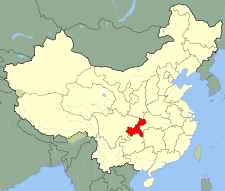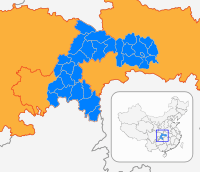Kaizhou District
Kaizhou District (Chinese: 开州区), formerly known as Kai County, Kaixian or Kaihsien (Chinese: 开县) is a district under the jurisdiction of Chongqing Municipality, in southwestern China, bordering Sichuan province to the west. It has an area of 3,959 square km. As of the end of 2009, it had a population of 1.62 million. It is located 330 kilometers from the urban centre of Chongqing proper.
Kaizhou 开州区 | |
|---|---|
District | |
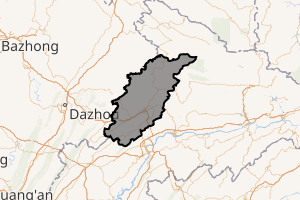
| |
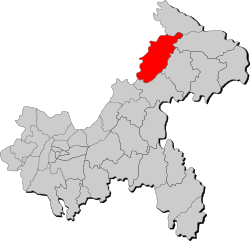 Location of Kaizhou in Chongqing | |
| Country | People's Republic of China |
| Municipality | Chongqing |
| Area | |
| • Total | 3,959 km2 (1,529 sq mi) |
| Population (2010)[1] | |
| • Total | 1,160,336 |
| • Density | 290/km2 (760/sq mi) |
| Time zone | UTC+8 (China Standard) |
| Website | kx |
| Kaizhou District | |||||||
|---|---|---|---|---|---|---|---|
| Simplified Chinese | 开州区 | ||||||
| Traditional Chinese | 開州區 | ||||||
| Postal | Kaihsien | ||||||
| |||||||
| Kai County | |||||||
| Simplified Chinese | 开县 | ||||||
| Traditional Chinese | 開縣 | ||||||
| |||||||
History
The county has a history dating back some 1800 years.
In 1373, during the Ming Dynasty, it adopted the name Kaizhou.
In the summer of 1907, there were disturbances in Kai County.[2] Around that time, government schools, Roman Catholic premises and China Inland Mission property as well as the homes of many Chinese Christians in Kai County were successively looted and destroyed.[3]
Li Ching-Yuen, known for his supposed extreme longevity, died in Kai County in 1933.[4]
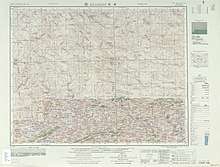
Unusual rain patterns and flooding in the Summer of 1982 led to land subsidence. It was reported in the September 6, 1982 edition of the Sichuan Daily that, "In the fourth Tuoxiang brigade, Hujia commune, Yuexi District, Kai County, more than 300 mu of land subsided; and 310 houses owned by a commune unit, a supply and marketing cooperative, 10 units and 16 commune households all subsided."[5]
Until 2004 the county was one of the poorest in the municipality, home to some 10% of Chongqing municipality residents that lived in poverty. The government has attempted to remedy this in recent years.[6]
In the March 27, 2015 edition of Beijing Today, Kai County was noted as "the nation's largest exporter of migrant labor. There were 535,000 from that county in 2014, and 15 percent were older than 50. In Fengcun Village, half the villagers are migrant workers."[7]
Kaizhou has been developing rapidly in recent years as the government works to maintain Hanfeng lake and encourage more people to invest in Kaizhou.
Administrative divisions
As of 2018, Kaizhou District administered seven subdistricts, twenty-six towns and seven townships.[1][8][9]
| Name | Chinese (S) | Hanyu Pinyin | Population (2010)[1][10] | Area (km2) |
|---|---|---|---|---|
| Zhendong Subdistrict | 镇东街道 | Zhèndōng Jiēdào | 18,819 | 26.5 |
| Fengle Subdistrict | 丰乐街道 | Fēnglè Jiēdào | 19,851 | 25 |
| Baihe Subdistrict | 白鹤街道 | Báihè Jiēdào | 40,937 | 79.2 |
| Hanfeng Subdistrict | 汉丰街道 | Hànfēng Jiēdào | 85,107 | 52 |
| Wenfeng Subdistrict | 文峰街道 | Wénfēng Jiēdào | 69,747 | 23.9 |
| Yunfeng Subdistrict | 云枫街道 | Yúnfēng Jiēdào | 41,674 | 23.74 |
| Zhaojia Subdistrict | 赵家街道 | Zhàojiā Jiēdào | 39,910 | 152 |
| Guojia town | 郭家镇 | Guōjiā Zhèn | 31,394 | 79 |
| Wenquan town | 温泉镇 | Wēnquán Zhèn | 39,402 | 149 |
| Tieqiao town | 铁桥镇 | Tiěqiáo Zhèn | 42,085 | 115 |
| Nanya town | 南雅镇 | Nányǎ Zhèn | 28,382 | 70 |
| Heqian town | 和谦镇 | Héqiān Zhèn | 20,632 | 80 |
| Zhen'an town | 镇安镇 | Zhèn'ān Zhèn | 15,452 | 56.67 |
| Zhuxi town | 竹溪镇 | Zhúxī Zhèn | 22,900 | 84 |
| Qukou town | 渠口镇 | Qúkǒu Zhèn | 14,437 | 68 |
| Houba town | 厚坝镇 | Hòubà Zhèn | 17,358 | 49 |
| Gaoqiao town | 高桥镇 | Gāoqiáo Zhèn | 23,608 | 78 |
| Yihe town | 义和镇 | Yìhé Zhèn | 26,313 | 61 |
| Dajin town | 大进镇 | Dàjìn Zhèn | 32,213 | 251 |
| Changsha town | 长沙镇 | Chángshā Zhèn | 47,170 | 136 |
| Linjiang town | 临江镇 | Línjiāng Zhèn | 71,149 | 123.2 |
| Dunhao town | 敦好镇 | Dūnhǎo Zhèn | 36,863 | 144 |
| Zhonghe town | 中和镇 | Zhōnghé Zhèn | 43,318 | 89 |
| Yuexi town | 岳溪镇 | Yuèxī Zhèn | 47,802 | 186 |
| Nanmen town | 南门镇 | Nánmén Zhèn | 40,941 | 158 |
| Heyan town | 河堰镇 | Héyàn Zhèn | 19,589 | 154 |
| Jiulongshan town | 九龙山镇 | Jiǔlóngshān Zhèn | 32,696 | 135 |
| Baiqiao town | 白桥镇 | Báiqiáo Zhèn | 13,796 | 84 |
| Tianhe town | 天和镇 | Tiānhé Zhèn | 14,818 | 67 |
| Jinfeng town | 金峰镇 | Jīnfēng Zhèn | 13,355 | 57 |
| Tanjia town | 谭家镇 | Tánjiā Zhèn | 15,261 | 125 |
| Wushan town | 巫山镇 | Wūshān Zhèn | 19,829 | 117 |
| Dade town | 大德镇 | Dàdé Zhèn | 31,548 | 118 |
| Baiquan Township | 白泉乡 | Báiquán Xiāng | 8,229 | 196 |
| Guanmian Township | 关面乡 | Guānmiàn Xiāng | 7,127 | 146.5 |
| Manyue Township | 满月乡 | Mǎnyuè Xiāng | 10,057 | 148.7 |
| Wutong Township | 五通乡 | Wǔtōng Xiāng | 10,057 | 60.67 |
| Maliu Township | 麻柳乡 | Máliǔ Xiāng | 17,451 | 96 |
| Zishui Township | 紫水乡 | Zǐshuǐ Xiāng | 20,396 | 94 |
| Sanhuikou Township | 三汇口乡 | Sānhuìkǒu Xiāng | 13,190 | 77.28 |
References
- 开州区历史沿革 [Kaizhou District Historical Development] (in Chinese). XZQH.org. 15 July 2016. Retrieved 17 March 2019.
2006年末,全县总面积3959平方千米。{...}2010年第六次人口普查,开县常住总人口1160336人,其中:镇东街道18819人,丰乐街道19851人,白鹤街道40937人,汉丰街道85107人,文峰街道69747人,云枫街道41674人,赵家街道39910人,郭家镇31394人,温泉镇39402人,铁桥镇42085人,南雅镇28382人,和谦镇20632人,镇安镇15452人,竹溪镇22900人,渠口镇14437人,厚坝镇17358人,高桥镇23608人,义和镇26313人,大进镇32213人,长沙镇47170人,临江镇71149人,敦好镇36863人,中和镇43318人,岳溪镇47802人,南门镇40941人,河堰镇19589人,九龙山镇32696人,白桥镇13796人,天和镇14818人,金峰镇13355人,谭家镇15261人,巫山镇19829人,大德镇31548人,白泉乡8229人,关面乡7127人,满月乡10057人,五通乡5530人,麻柳乡17451人,紫水乡20396人,三汇口乡13190人。
- The Millions 1907. [Philadelphia] China Inland Mission. 1907. p. 108.
- Broomhall, Marshall (1908). Present-day conditions in China : notes designed to show the moral and spiritual claims of the Chinese empire. Fleming H. Revell Company. p. 18.
- Complete Stories. 1933. p. 95.
- DTIC ADA353303: China Report, Agriculture No. 229. 28 September 1982. p. 95. Retrieved 17 March 2019.
- 开县概况. Kaizhou. Archived from the original on 23 April 2012. Retrieved 1 May 2012.
- Yang Xin (27 March 2015). Slow Pension Reform Leaves Migrant Workers Behind. p. 3. Retrieved 18 March 2019.
- 开州概况--行政区划 [Kaizhou Overview--Administrative Divisions] (in Chinese). Archived from the original on 22 March 2019. Retrieved 17 March 2019.
全区共40个街道镇乡,其中街道7个:汉丰街道、文峰街道、云枫街道、镇东街道、丰乐街道、白鹤街道、赵家街道;镇26个:大德镇、镇安镇、厚坝镇、金峰镇、温泉镇、郭家镇、白桥镇、和谦镇、河堰镇、大进镇、谭家镇、敦好镇、高桥镇、九龙山镇、天和镇、中和镇、义和镇、临江镇、竹溪镇、铁桥镇、南雅镇、巫山镇、岳溪镇、长沙镇、南门镇、渠口镇;乡7个:满月乡、关面乡、白泉乡、麻柳乡、紫水乡、三汇口乡、五通乡。 2016年8月部分村居建制调整后,全区共辖427个行政村、107个社区。
- 2018年统计用区划代码和城乡划分代码:开州区 [2018 Statistical Area Numbers and Rural-Urban Area Numbers: Kaizhou District] (in Chinese). National Bureau of Statistics of the People's Republic of China. 2018. Retrieved 17 March 2019.
统计用区划代码 名称 500154001000 汉丰街道办事处 500154002000 文峰街道办事处 500154003000 云枫街道办事处 500154004000 镇东街道办事处 500154005000 丰乐街道办事处 500154006000 白鹤街道办事处 500154007000 赵家街道办事处 500154100000 大德镇 500154101000 镇安镇 500154102000 厚坝镇 500154103000 金峰镇 500154104000 温泉镇 500154105000 郭家镇 500154106000 白桥镇 500154107000 和谦镇 500154108000 河堰镇 500154109000 大进镇 500154110000 谭家镇 500154111000 敦好镇 500154112000 高桥镇 500154113000 九龙山镇 500154114000 天和镇 500154115000 中和镇 500154116000 义和镇 500154117000 临江镇 500154118000 竹溪镇 500154119000 铁桥镇 500154120000 南雅镇 500154121000 巫山镇 500154122000 岳溪镇 500154123000 长沙镇 500154124000 南门镇 500154125000 渠口镇 500154200000 满月乡 500154201000 关面乡 500154202000 白泉乡 500154203000 麻柳乡 500154204000 紫水乡 500154205000 三汇口乡 500154206000 五通乡
- shi, Guo wu yuan ren kou pu cha ban gong; council, Guo jia tong ji ju ren kou he jiu ye tong ji si bian = Tabulation on the 2010 population census of the people's republic of China by township / compiled by Population census office under the state; population, Department of; statistics, employment statistics national bureau of (2012). Zhongguo 2010 nian ren kou pu cha fen xiang, zhen, jie dao zi liao (Di 1 ban. ed.). Beijing Shi: Zhongguo tong ji chu ban she. ISBN 978-7-5037-6660-2.
